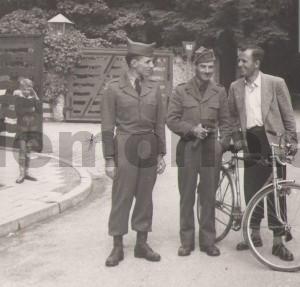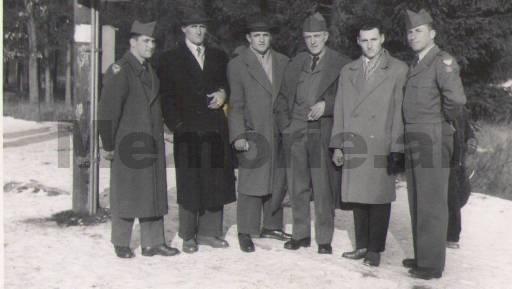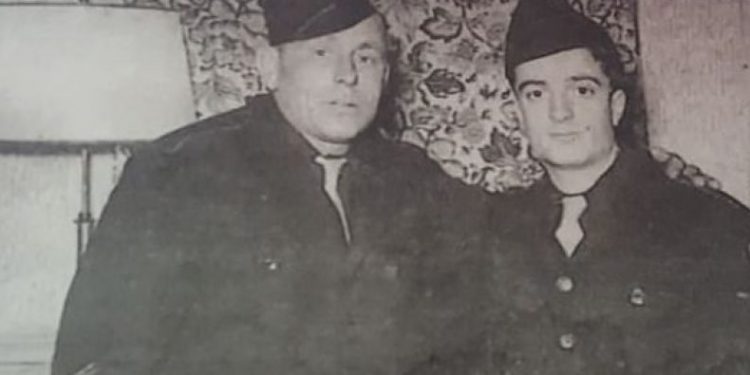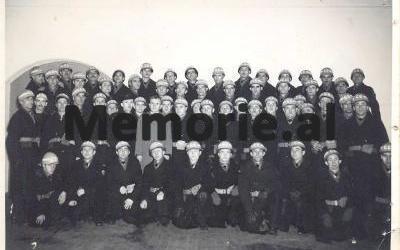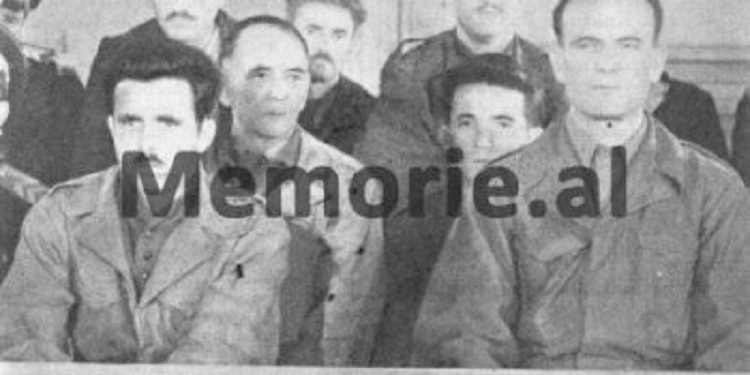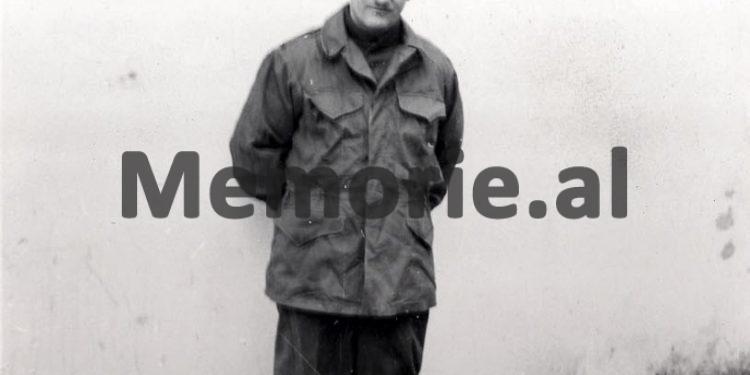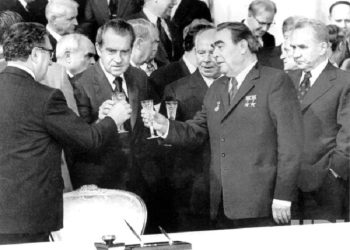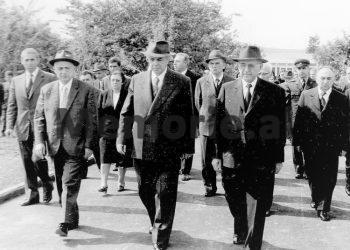Memorie.al / Enver Hoxha’s dictatorial communist regime was very harsh towards all deserters and those who tried to escape from Albania. In a document declassified by the CIA, details are given on what happened in the years 1951 – 1952. The CIA managed to recruit many agents, with the help of Yugoslavia, but according to the document, many individuals who tried to leave country and were giving information, they were shot. There are given the names of many individuals, who were also known as the leaders of resident groups in the North area. On the other hand, details are given about a 28-year-old Albanian, whose name has not been published, who was a loyal agent of the Greeks. Hamit Matjani is also mentioned there. He is a well-known name, as a “chief saboteur” and the communist regime tried to execute him several times. The CIA states that; one of their agents had communicated with him and the document gives his impressions of Matjani.
CIA SECRET DOCUMENT ON THE SITUATION IN ALBANIA IN 1952
September 5, 1952
Operational plan for Albania, “Charity”
-Correspondence from Albanians in Yugoslavia-
Attached are two letters sent on August 21 and 22, 1952, from the informant in Sabac, Yugoslavia. The writer informs the source that he and… have started working as a mechanic and an electrician, respectively, in the Zorka chemical factory, in Sabac, to supplement the income of over 3000 dinars per month, which they receive from the Yugoslav government, which they do not enough for all needs. Also, as Colonel Cedo Mijovic explained to them, everyone must work to make the socialist program a success.
In the August 21 letter, he explains the mission of the six-man group from Yugoslavia to Albania. Ded Pjetra, who killed a sergeant and a communist major at Ura e Mesi, along with a soldier, are reported to be still alive and have not yet returned to Yugoslavia. Hilë Shllaku, Shpend Bushati (former Albanian Security agent who defected to Yugoslavia in February 1951) and an unidentified third have been killed in Albania. A few days before his letter, another mission that also included Pjetër Smaili entered Albania.
The details
In his second letter, mainly by way of confirmation of the previous information, but unfortunately without specifying the dates or the special circumstances, the writer gives the following information, regarding the mentioned individuals: “The brothers arrived in Skopje Ndue, Pal and Martin Lala, a son of Gjergj Nikoll Ndreu and three unidentified people from Kruja; Gjergj Kol Ndreu and his son Zef were killed; Yak Lala; John N. Ndreu’s two sons, Cole and Mark; the son of Llesh Gjok Lala, Peter; and Geg Zef Hyseni. They were wounded or captured by the enemy, Gjon Lalë Piroli; Peter Mark Ndoja; John Ndue Perjaku, and another individual, who later died. The entire group above was betrayed in Mamurras by Gjin Cara from Perlati.
The death of 15 people
Following the said letter, the informant continues to report, writing that: “On August 11, 1952, Pjetër Kimza, Dom Zef Oroshi, Frrok N. Jaku, Kol Perdoda, Ndue Jak Zefi and five other individuals, unidentified, arrived in Yugoslavia. Members of another group of ten people, who were headed to Yugoslavia from Pjeter Cup Qafa, reported the death in Albania of 15 individuals, including: Llesh Kaziu, Frrok Z. Peshku, Prend Ndue Marku, Ndue Llesh Frroku, Zef e Dodë Coku, Marka Pjeter Gjini, Llesh Froku, Zef Marka Tuci. Almost all the leaders of the anti-communist resistance in Albania have been arrested, while Llesh Frrok Geci, Preng Gjok Deda and his sons, and Osman Vora, have been handed over to government forces.
The informant reports that; according to his opinion, the Yugoslavs have deliberately destroyed the organization supported in Albania.
February 7, 1952
Monthly activity report
The activities of our branch for the infiltration of agents and supplies have been hampered this month by the Balkan winter, which has made operations in Albania impractical. Several attempts were made to infiltrate groups of four agents into the southeastern areas of the country to determine the response to the December supply and propaganda releases, but it was decided to postpone the operation until the cold weather broke. The air raids in the country have been successful, with supplies and 200,000 propaganda pamphlets (tracts) being dropped from the air in Tirana and Northern Albania, on January 21.
On the political front, Radio “Alshqiperia e Lire” continues its daily broadcasts and the newspaper “Alshqiperia” continues to be published, but now from Rome and not from New York. The change of location, we believe, has brought better quality and a fresher look, from a journalistic point of view. Within the “Free Albania” National Committee, our pressure for expanding the political base has continued.
Agent information
We recently received a letter written in ink from our group of four agents operating in Kukës, Northern Albania. The letter advises that the four members of the group spend the winter in Prizren, Yugoslavia, and return to Albania in the spring. They requested, and are being sent food and money, to spend the winter in Yugoslavia. A group of three agents released in central Albania in October, we have no information.
In the psychological warfare sector, we continued broadcasting according to the clandestine radio program, “Voice of Free Albania”, from the station near Athens. In the third edition of the publication of the NCFA body, it is written about the commitment of Yugoslavia and Greece, for the preservation of the territorial integrity of Albania, and for the acceptance in principle of Italy. This news received considerable attention in the Western press. NCFA’s newsletter is published irregularly in English, French and Italian.
On January 21, we released a shipment of supplies and propaganda in the North of Albania, in the cities of Shkodra, Kukës, Burrel and Tirana. The supplies contained 900 cans of simple food and 250 bags, each containing 300 grams of flour.
Publication of brochures
A leafleting mission this month was combined with the dropping of propaganda supplies due to poor weather conditions. 200,000 folded brochures and 5,000 copies of the “Albania” newspaper were released, and with the improvement of the weather, releases will also begin in the southern area of the country. In political developments, we mention Ihsan Toptani of the “Free Albania” Committee, who participated in the meeting of the European Movement gathered on January 20 in London.
The “Albanian Association of Political Asylums” in Yugoslavia, formed on May 10, 1951, is reported to have started the distribution of the new publication “The Flag of Freedom”, which apparently supports the effort of Albanians against the tyranny of the Hoxha government. We have had several reports of differences between the actions of our officers and those of the British, signaling that the British may be following a uni-lateral policy of action, in relation to the National Committee “Free Albania”.
Training
The appointment of Ibrahim Kelmendi and Adem Selim in the USA was canceled at the last moment, due to the inability of the NCFA committee members to agree on the final selection of the two individuals. As for recruitment, a guide has been engaged as a support agent for future ground infiltrations. The British services have offered to give to our operation three radio operations students, whose training is said to be complete, at three-quarters of the way. Meanwhile, the skills of the three British agents are being tested and if they are found to be capable, they will be admitted to radio-agent courses in Germany.
Twenty Albanians, who completed the agent course and were kept ready in Athens, have returned to Germany, to the Guard Company. This action was taken to increase the security of future infiltrations.
April 4, 1952
Report on the activities of Albanian refugees, Athens
On February 27, 1952, our sources submitted the following report at our request on the situation of Albanian refugee activity in Athens. Special attention should be paid to the identification of… as an agent of the Greek services and the version of his approach to our service. Hami Matjani’s views regarding the current and future possibilities for operations in Albania are considered of special interest.
Number and location of refugees in Greece
There are about 300-320 Albanian refugees in the Lavrion camp, about 40 km. away from Athens; 25-35 of them live near Athens, while about 40-50 others are kept in the disciplinary concentration camp, together with refugees of other nationalities, on the island of Syros.
Main figures
The main representative of the ‘Balli-Agrar’ Party is the ex-communist Skënder Dume, grandson of the well-known communist colonel Petrit Dume, commander of the People’s Defense units of Korça. The Legality Party is represented by Myftar Spahia, fanatical supporter of King Zog. The ‘Independent National Bloc’ is represented by Ihsan Toptani, who spends most of his time in Athens and also participates in NCFA activities, but is generally considered an agent of the Greek services. He travels frequently to Athens, Rome, Paris, London and Munich, and the true nature of the activities is undetermined.
The role of political leaders
All the characters mentioned above have more or less contact with the Greek intelligence services. Acting on behalf of their respective parties, with the main purpose of maintaining the morale of their supporters, they are required to report to political leaders. This political factor causes their security to be weak and what should be reserved information, sooner or later, become the subject of conversation among all circles of Albanian immigrants in Athens. This situation has been confirmed by our sources and by the Greek general Nikolopoulos, who says that his network is well informed about the activities of Albanians in Greece and other countries, as a result of correspondence with Albanians in the country.
The 28-year-old Albanian … is a Greek and American agent. He was born in Gjirokastër and was previously an active communist and partisan in the struggle against the fascist and German invaders. Later, he was employed by the Ministry of Public Works after the war. With his duties, he made several trips to Belgrade and Moscow. He escaped to Greece in 1948 and was later parachuted several times into Albania, on intelligence missions. His current task is to report on the movements and conversations of his fellow countrymen in Athens.
The role of Hami Matjani
Our source in Athens spoke at length with Matjani, whom he described as a simple peasant, with sound judgment and a calm temperament. The source further reported on Matjani’s opinions on Albania, on the anti-nationalist measures taken by the government and the mindset of the local anti-communist population. According to him, in the years 1948-’49, believing a lot in the efforts of the allies for Albania, the local populations gave their support to the foreign missions in the country. With the increase in the number of these missions in Albania and especially after the capture of Et’hem Çako’s group, popular support declined, especially in the South of Albania.
The trial in Tirana of Ethem Çako, through the distorting propaganda of the government, brought to light several aspects of the West’s operations against Albania, which also influenced the reduction of support. Some missions in Albania, disguised under the guise of one emigration party or another, instead of maintaining their propaganda exclusively against communism, tried to influence the population also in favor of their particular parties, bringing about an effect completely undesirable, that of mistrust towards immigration political groups, due to the division between them. This propaganda policy actually served the power of Tirana, which turned the divergences between anti-communist groups to its advantage.
The actions of the communists
The numerous trials of the captured anti-communists have been cunningly used by the communists to show that the activity of the political leaders of the emigration has to do with the supply of American and British espionage agents. Their propaganda makes it known that the leaders themselves, with this activity, ensure a life of luxury in the capitals of Western Europe and the USA.
Weak selection criteria for agents and failed training have contributed to the lack of success of the missions in Albania. The above thoughts come from a person who is motivated only by patriotism in his activity, so they cannot be easily dismissed. His sincerity has been demonstrated by the many missions he has carried out and the wounds he bears on his body. Regarding the friends of his followers, Matjani says that; they have left him, despite the protests, but he has never learned the reasons.
Intelligence activities in Greece
Albanian refugees in Athens report that cooperation between Greek and American intelligence is very close. Recent changes in US personnel have made no difference, according to refugees not affiliated with NCFA. The new officer is not seen with the same respect that his predecessor possessed, regarding his behavior and contacts with Albanians.
Some recent Greek intelligence operations in Albania have had heavy and unnecessary losses, due to poor training of agents and deployment in unsafe areas. Some agents have broken their legs during the parachute drop, while being unable to move they were forced to be killed by their comrades, or to commit suicide to avoid capture.
In conclusion, the sources emphasize that although the above information was fragmentary, it can be considered as an indication of the extent of the difficulty of obtaining intelligence on the activities of Greek intelligence, and express confidence that more information can be gathered, by means of agent’s communists there. Memorie.al




